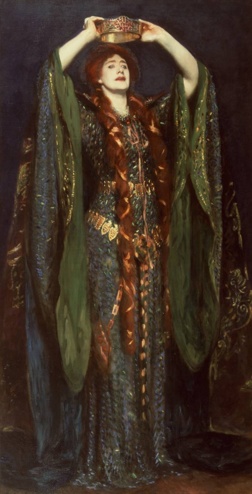Lady Macbeth
for mezzo-soprano and orchestra (2013)
Duration: 25 minutes
Orchestration: 2*2*22* - 2200 - timp - harp - strings (minimum 6-6-4-4-2)
Commissioned by the Swedish Chamber Orchestra
Performed by Katarina Karnéus, mezzo-soprano, and the Swedish Chamber Orchestra, conducted by Gérhard Korsten.
Live recording in Örebro Concert Hall, 3rd October 2013.
Lady Macbeth
Lady Macbeth
for mezzo-soprano and piano (2009)
Duration: 12 minutes
Commissioned by the Swedish Radio
Performed by Katarina Karnéus, mezzo-soprano, and Matti Hirvonen, piano.
Live recording at Folkoperan, Stockholm, 9th April 2009.
Score
Score
Commentary
Commentary
The text (see further down) is taken from the fifth scene of the first act. Lady Macbeth receives a letter from her husband, that tells her about an encounter he has had with three witches, when returning from a succesful battle. The Weird Sisters predict that he will be promoted to Thane of Cawdor, and more still: one day, he will be the crowned King of Scotland. When they disappear, messengers from King Duncan arrive to tell Macbeth that he has indeed been promoted.
The Lady is excited by the letter, but also troubled by the all-to-human character of her husband: he doesn't have what it takes to become what the witches has prophesied. She wants him to come home quickly, so that she may induce in him the evil, that is necessary to perform the unspeakable deeds that stand between them and the royal crown.
In the last part, the Lady has received a message that Macbeth is coming home - together with king Duncan, that will spend the night at their castle. She now understands that this is the time to act, and she summons all the dark powers of hell to transform herself into a dire, sex-less, cold-blooded being, unable to feel remorse of her murderous acts.
The first version was written for mezzo-soprano and piano, and was commisioned by the Swedish Radio. In 2013, a new version for mezzo-soprano and orchestra was commissioned by the excellent Swedish Chamber Orchestra, and I was delighted to not just orchestrate the songs, but to really compose a kind of "orchestral poem", where the soloist is integrated.
The orchestral version starts with a long prelude, depicting the overall atmosphere of the play, a gloomy Scottish sunset, and the predictions of the Weird Sisters. After this prelude, we meet the Lady reading the letter from Macbeth, and her response to it. This is followed by a large orchestral interlude, depicting the twisted relationship between the Lady and her husband. Then, as the croak of the raven is heard, the Lady conjures up all the evil spirits of hell in the last song. This is followed by a short, but awfully triumphant postlude.
Text (from the tragedy of Macbeth by William Shakespeare)
[Reads.] "They met me in the day of success: and I have learned by the perfect'st report, they have more in them than mortal knowledge. When I burned in desire to question them further, they made themselves air, into which they vanished. Whiles I stood rapt in the wonder of it, came missives from the king, who all-hailed me 'Thane of Cawdor'; by which title, before, these weird sisters saluted me, and referred me to the coming on of time, with 'Hail, king that shalt be!' This have I thought good to deliver thee, my dearest partner of greatness, that thou mightst not lose the dues of rejoicing, by being ignorant of what greatness is promised thee. Lay it to thy heart, and farewell."
Glamis thou art, and Cawdor; and shalt be
What thou art promised. Yet do I fear thy nature;
It is too full o' the milk of human kindness
To catch the nearest way. Thou wouldst be great;
Art not without ambition, but without
The illness should attend it. What thou wouldst highly,
That wouldst thou holily; wouldst not play false,
And yet wouldst wrongly win: thou dost have, great Glamis,
That which cries "Thus thou must do, if thou have it";
And that which rather thou dost fear to do
Than wishest should be undone. Hie thee hither,
That I may pour my spirits in thine ear;
And chastise with the valour of my tongue
All that impedes thee from the golden round,
Which fate and metaphysical aid doth seem
To have thee crown'd withal.
The raven himself is hoarse
That croaks the fatal entrance of Duncan
Under my battlements. Come, you spirits
That tend on mortal thoughts, unsex me here,
And fill me from the crown to the toe top-full
Of direst cruelty! make thick my blood;
Stop up the access and passage to remorse,
That no compunctious visitings of nature
Shake my fell purpose, nor keep peace between
The effect and it! Come to my woman's breasts,
And take my milk for gall, you murd'ring ministers,
Wherever in your sightless substances
You wait on nature's mischief! Come, thick night,
And pall thee in the dunnest smoke of hell,
That my keen knife see not the wound it makes,
Nor heaven peep through the blanket of the dark,
To cry "Hold, hold!"




